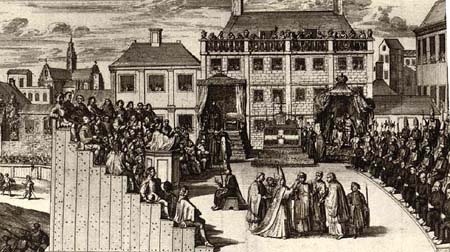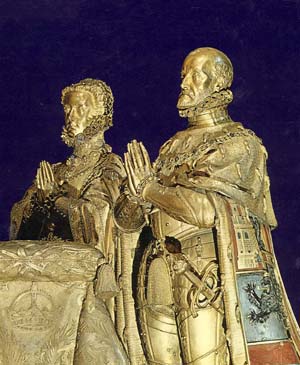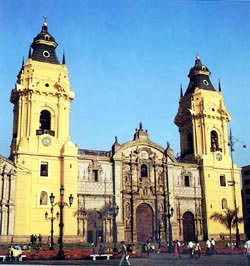 |
The Saint of the Day
St. Toribio de Mogrovejo, March 23
Prof. Plinio Corrêa de Oliveira
Biographical selection
Toribio Alfonso de Mogrovejo was born in 1538 in Mayorca, Spain, into a noble family. From childhood, his disposition was turned toward virtue and against sin. He also had a great devotion to the Most Holy Virgin. He prayed her Office and the Rosary every day and fasted on Saturdays in her honor. He had a natural inclination for academics, and studied law at Valladolid and Salamanca.
In recognition of his virtue and learning, King Philip II named him chief judge of the Supreme Court of Granada, and head of the Inquisition in the same city. He carried out this office in an exceptional way for five years.

Philip II named St. Toribio Mogrovejo head of the Inquisition at Granada. The picture shows a session of the Inquisition being directed by a Bishop.
|
In 1580 when the Episcopal See of Lima, Peru, became vacant, the King selected him to fill this position. Toribio protested he was not worthy of the honor and used his knowledge of Church law to contest the appointment. He was overruled, consented, and was ordained priest and consecrated Bishop in order to fulfil his new obligations. He arrived in Lima, Peru to assume his office in 1581 at age 43.
His Diocese was immense, and the morals of the Spanish clergy and laymen were very far from being perfect. He also found that the Indian population were being exploited and persecuted. This did not discourage St. Toribio. On the contrary, he resolved to apply the decisions of the Council of Trent in order to reform the region.
Gifted with an exceptional prudence and great zeal, he began with a reform of the clergy. He was inflexible regarding any moral scandal. He became the scourge of public sinners and the protector of the oppressed. For this reason he was strongly criticized and persecuted, but he received the support of the virtuous Viceroy who had recently arrived in Lima, Don Francisco de Toledo.
Thus he achieved the moral reform he had set out to make. He always did everything he could to save souls, from the greatest to the smallest. He offered his protection to the Indians and, even at an advanced age, he learned many of their dialects so that he could teach them the Catechism. His vigorous action was illuminated by an intense spiritual life – offering Masses, frequent confession as well as meditations, long hours of prayers and severe penances.
On a diocesan visitation, St. Toribio fell ill with fever at Pacasmayo and was only able to reach the city of Santa, far from Lima. He foresaw his death and distributed his belongings to his servants and the rest of his property to the poor. He died with the words of Jesus Christ on his lips: “Lord, into Thy hands I commend my spirit.” The great apostle of Peru died on March 23, 1606.
Comments of Prof. Plinio:
It is a very beautiful biography. I will choose a few points from the reading to comment on.
First, naturally, is the great devotion of this saint to Our Lady. Without devotion to Our Lady there is no sanctity, and in a certain sense, devotion to Our Lady is the measure of sanctity.

King Philip II and Queen Anne Marie, his wife
|
A second interesting point is that King Philip II noticed this very pious man and called him to exercise an important office in the Judiciary. Here you can see the difference from our times. Who among you has heard something similar regarding today’s presidents? For instance, President X was in this or that place and heard about a very religious man – one who fasted, made penances, and prayed the Little Office of Our Lady. Meeting this man, the president was so impressed by his virtues that he invited him to assume an important office in the Judicial Branch. I imagine that no one has heard of such a thing. No one thinks that this could happen, because today people know that none of the present-day Heads of State select their government officials because they are pious and virtuous.
But Philip II invited St. Toribio to assume an important office. Which one? To be chief judge of the Supreme Court and president of the Holy Inquisition Against the Perfidy of the Heretics. With this, our Saint was transformed into a persecutor of heretics. He was a man who left the cool shade of the sanctuary, the serenity of a life of piety and study to become the whip of heretics. I do not see any contradiction between these two styles of life; they are complementary. And the text tells us that St. Toribio exercised his office so well that he was promoted - he was chosen to be Bishop of Peru.
You see the great prestige that sanctity had at that time, and how it was considered an indispensable element to maintain a good government. Philip II understood that only a saint could end the moral corruption into which Peru was sinking; only a saint could bring a Catholic lifestyle and civilization to the Colony. The King’s primary concern was not money, as the revolutionary propaganda likes to spread about the Spanish and Portuguese kings of that time. What was the monetary advantage for Philip II to send a man of this capacity and moral value to make spiritual reforms in Peru? None. Rather, his concern was to consolidate the Kingship of Our Lord in Peru.

St. Toribio played an instrumental role in the building of the Cathedral of Lima, above
|
In Peru St. Toribio began to act. He became the scourge of the bad clergy. I think that an authentic saint has to be a scourge not only of vice in theory, but also of bad people. For this reason, he determined to reform the clergy. To reach his end, he relied on the support, virtue and prestige of another man whom Philip II had sent to Peru to exercise the role of Viceroy, Don Francisco de Toledo.
St. Teresa of Avila used to call Philip II “our saint King Philip.” Thus there was at that time a very Catholic King of Spain, a Bishop of Lima who was a Saint, and a very virtuous Viceroy of Peru. What a good situation! How very different from our times! What a great fall we have experienced! I think that one of the principal temptations we have is to think that we are living in a normal situation. We have lost the notion of the height from which we have fallen.
Pius XII made this very intelligent and profound observation. He used to say that the gravest sin man committed in the 20th century was to have lost the notion of sin. We can never stress this truth too much.
Well, a similar thing has taken place with regard to the social reality. We have lost the notion of what the normal social order should be. We have lost the reference point for our own decadence. What is normal is not to live as we do, but to have Saints as Bishops, to have an ardent Catholic as a King, and to have a virtuous man as a Viceroy.
We should ask St. Toribio de Mongrovejo, who fought against the corruption of his time, for strength to fight against the general situation of impiety and neo-paganism that prevails today, and to not think of it as normal. We should ask this Saint, who was an inquisitor, for the grace to defeat the Revolution, this movement which is destroying Catholic Civilization. We also should ask him for the re-installment of a truly Catholic and counter-revolutionary order, announced by Our Lady at Fatima, which will be the Reign of Mary.


  |
|
Prof. Plinio Corrêa de Oliveira | |
The Saint of the Day features highlights from the lives of saints based on comments made by the late Prof. Plinio Corrêa de Oliveira. Following the example of St. John Bosco who used to make similar talks for the boys of his College, each evening it was Prof. Plinio’s custom to make a short commentary on the lives of the next day’s saint in a meeting for youth in order to encourage them in the practice of virtue and love for the Catholic Church. TIA thought that its readers could profit from these valuable commentaries.
The texts of both the biographical data and the comments come from personal notes taken by Atila S. Guimarães from 1964 to 1995. Given the fact that the source is a personal notebook, it is possible that at times the biographic notes transcribed here will not rigorously follow the original text read by Prof. Plinio. The commentaries have also been adapted and translated for TIA’s site.
|
Saint of the Day | Home | Books | CDs | Search | Contact Us | Donate

© 2002- Tradition in Action, Inc. All Rights Reserved
|
 |
|